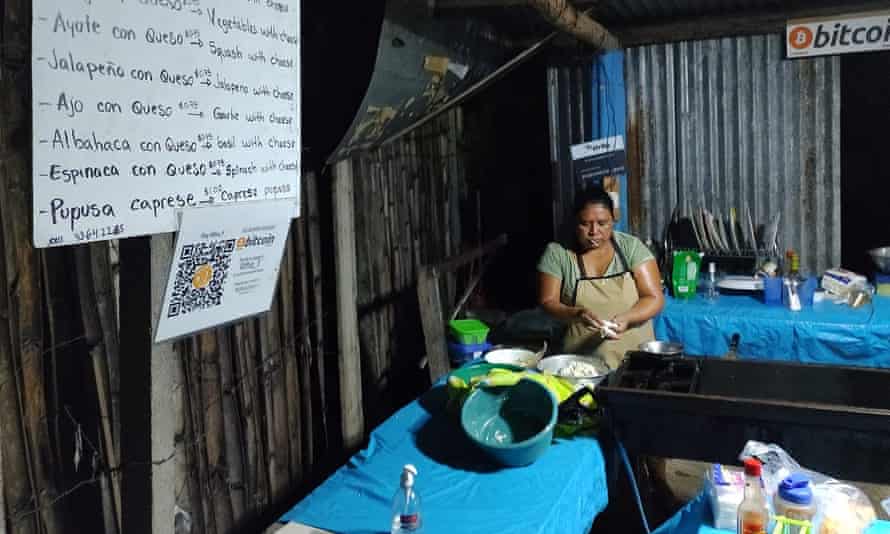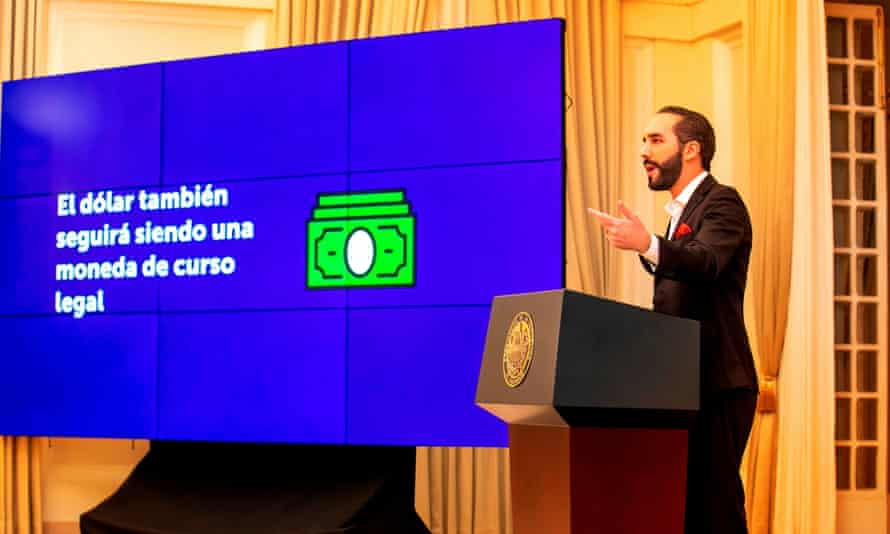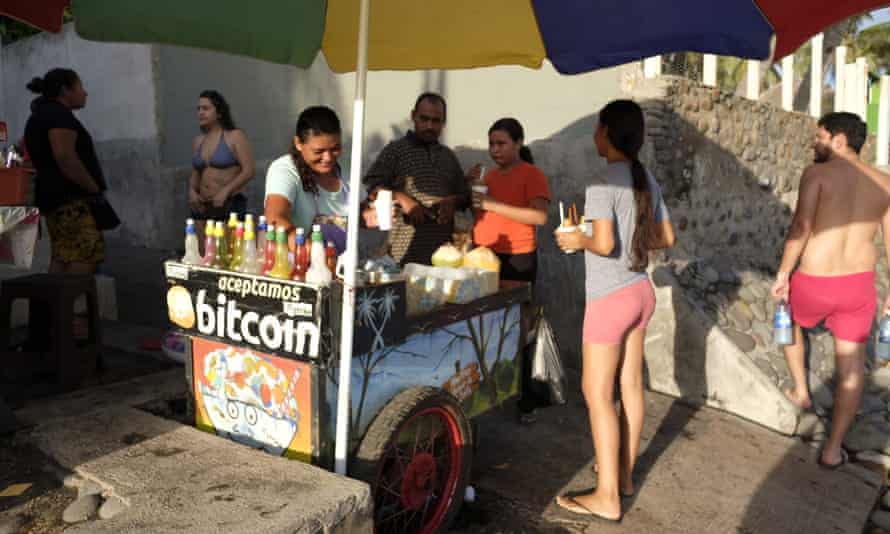Litha María de Los Angeles slaps two cheese-filled pupusas – the El Salvadoran cornmeal flatbread – on the griddle. With a camera click on the QR code, she receives her payment: four hundred-thousandths of a Bitcoin. Then, as the rain pelts the corrugated iron roof and a gust of wind lifts the blue plastic table cloths, the power cuts out.
A tumultuous few weeks awaits El Salvador as it prepares to become the first country to adopt Bitcoin, the world’s most popular decentralised digital currency, as legal tender on 7 September. With that deadline looming, a host of challenges – technological, financial and criminal – threaten to sink the plan of the president, Nayib Bukele, to ride the Central American economy out of its current choppy waters on the back of a cryptocurrency wave.
El Zonte, a surf town with about 3,000 residents and a black sand, pebble-strewn beach, is an unlikely location for a global financial revolution. But since 2018 the town’s Bitcoin Beach project has been a petri dish for cryptocurrency adoption. Backed by Californian donors, the project gave $50 (£36) in Bitcoin to each local family, encouraged the cryptocurrency’s adoption by local vendors, and paid dozens of social projects with it, from lifeguarding to rubbish collecting.

“Now you can buy groceries, pupusas, or pay for your internet with Bitcoin,” says José Roman Martínez, 30, one of the founders of Bitcoin Beach. “For many people, this is the first time they’ve received a digital payment.”
Interest in the project from crypto-savvy tourists has given a new lease of life to El Zonte and led to a real-estate boom in the town, according to Martínez. “When I was a kid, the only thing Salvadorans wanted to do was to cross the border and head to the US. Now the kids here are dreaming of better things.”
Can a circular-economy experiment backed by a handful of foreign crypto-evangelists replicate itself at the national level? Salvadorans have had no say in the matter so far, but they are about to find out.
Bukele announced his plan to elevate Bitcoin to legal tender in June (a month before his 40th birthday) with his customary millennial elan: via video link to a Miami cryptocurrency conference. Since then, like Elon Musk with a presidential mandate, he has prolifically pumped out Bitcoin memes and promises on his Twitter account.
Just five days after the announcement, lawmakers passed the bill by a large majority. A national digital wallet called Chivo – local slang for “cool” – is in development with $30 worth of Bitcoin uploaded to each one as an initial balance. Transactions in Bitcoin will be exempt from capital gains tax, and foreigners investing three Bitcoins in the country (about $120,000) will be granted residency.

In August a research note by Bank of America enthused about the new law’s ability to reduce the cost of cross-border transactions (remittances account for 20% of El Salvador’s GDP), increase digital penetration in a country where 70% of people still do not use banks, and attract foreign investment as a first mover in cryptocurrency adoption.
Since then, however, the verdict from international financial organisations – and El Salvadorans themselves – has turned decidedly pessimistic.
“The law was adopted extremely quickly, without a technical study or a public debate,” says Ricardo Castañeda, a local economist. “I don’t think the president has fully understood the implications of the law, its potential to cause serious macroeconomic problems and convert the country into a haven for money laundering.”
The regulatory framework for adoption has yet to be published and there are rumours of delays to the Chivo app. Bankers in the capital say they have received calls from anxious clients threatening to withdraw their deposits rather than risk exposure to the volatile cryptocurrency markets.
The ratings agency Moody’s downgraded El Salvadoran debt over fears of “weakened governance” evidenced by the new law, and the IMF – with which the government is negotiating a $1bn loan – published a blogpost highlighting the risks of adopting crypto as national currency.
“The shift from euphoria to scepticism has been very fast,” says Castañeda.
The potential benefits identified by the Bank of America are probably overstated. A paper by Johns Hopkins University says the cost of remittances via Bitcoin will be higher than traditional methods, and a July survey found that nearly two-thirds of El Salvadorans would not be open to accepting payment in Bitcoin.
Eric Grill, CEO of Chainbytes, which produces Bitcoin ATMs, told the Guardian that his plan to relocate manufacturing to El Salvador had faced serious challenges in sourcing parts. Local geothermal energy experts say Bukele’s plan to power energy-intensive Bitcoin mining activities from the country’s volcanoes are wildly optimistic.

The government insists that El Salvadorans will be free to exchange their Bitcoin for US dollars, which the country adopted as national currency in 2001, and has proposed a $150m fund to ensure convertibility. Given popular scepticism, however, critics say this is unlikely to be sufficient. It would also open the door for illegal actors to convert Bitcoin – which rose to prominence on Silk Road, an online black market, and prides itself on the anonymity of transactions – to dollars via a national bank and thereby launder their gains.
Perhaps the biggest concern, however, is that it exposes a population with little financial education – for the most part, without an economic safety net – to the fate of the highly volatile cryptocurrency markets.
“The Bitcoin law essentially gambles with two public purses, that of the El Salvador government and of the IMF,” says Daniel Munevar, a Colombian economist focused on debt justice. “It’s one thing for an American to bet his stimulus cheque on cryptocurrency in the hope of big returns, but this is Yolo [you only live once] investing elevated to the national level.”
In El Zonte, locals are developing their own common-sense investment strategies. Dominga Peña sells minutas – cups of shaved ice flavoured with fruit syrups – on the beach.
She says one in 10 customers pay with Bitcoin and she keeps most of that as an emergency spending fund for small purchases. “The people from Bitcoin Beach explained the benefits and disadvantages [of receiving crypto-payments],” she said. “It changed my mentality to investing, but I wouldn’t keep too much money in Bitcoin. The price has gone up and down a lot recently.”
from WordPress https://ift.tt/2YalcLx
via IFTTT

No comments:
Post a Comment